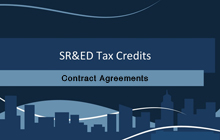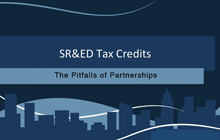CRA routinely disallows parking expense claims, even for life-threatening illnesses

It is not the Tax Court's job to provide equitable relief, David Rotflesich explains, as the Income Tax Act provides a bright-line test for medical expense tax credits
Keehn v. The King, 2023 TCC 1 and Medical Expense Deduction
 |
David J Rotfleisch, CPA, JD is the founding tax lawyer of Taxpage.com and Rotfleisch & Samulovitch P.C., a Toronto-based boutique tax law corporate law firm. |
Keehn v. The King is the perfect illustration of the principle that there is no equity in tax law and of the tax courts choosing to enforce the "letter of the law," regardless of how inequitable it may appear. It also provides an insight into the court's position on the intersection of the Income Tax Act, s. 15(1) of the Canadian Charter of Rights & Freedoms, and public policy.
This case is particularly fascinating to tax commentators due to the simplicity of its facts. Mr. Keehn appealed the reassessments made for his 2018 taxation year in which the Canada Revenue Agency disallowed $853 claimed as "medical expenses" under s.118.2 of the Income Tax Act. Mr. Keehn's wife received kidney dialysis treatment three times a week at the Royal Alexandra Hospital in Edmonton. Mrs. Keehn would drive from her home to the hospital located approximately 22 kilometers from her house. Upon reaching the hospital she would park her car and pay for parking. Overtime, these parking bills accrued to $853.
Mr. Keehn argued that the Income Tax Act discriminates by not considering parking expenses for medical treatment within a roundtrip distance of 80 kilometers.
The Income Tax Act's Bright-Line Test for Medical Expense Tax Credits
Mr. Keehn claimed the parking expenses in addition to various other medical expenses. The CRA allowed $6,342 of medical expenses but refused the parking costs. The CRA's denial of the parking costs as a medical expense was based on paragraph 118.2(2)(g) and (h) of the Income Tax Act.
Paragraphs 118.2(2)(g) and (h) of the Income Tax Act provide:
(2) [Medical expenses] For the purposes of subsection (1), a medical expense of an individual is an amount paid
(g) to a person engaged in the business of providing transportation services, to the extent that the payment is made for the transportation of
-
- the patient, and
- one individual who accompanied the patient, where the patient was, and has been certified in writing by a medical practitioner to be, in capable of traveling, without the assistance of an attendant
from the locality, where the patient dwells to a place, not less than 40 km from that locality, where medical services are normally provided, or from that place to that locality, if - substantially equivalent, medical services are not available in that locality,
- the route travelled by the patient is, having regard to the circumstances, a reasonably direct route, and
- the patient travels to the place to obtain medical services for himself or herself, and it is reasonable, having regard to the circumstances, for the patient to travel to that place, to obtain those services;
(h) for reasonable travel expenses (other than expenses described in paragraph (g)) incurred in respect of the patient and, where the patient was, and has been certified in writing by a medical practitioner to be, incapable of travelling, without the assistance of an attendant, in respect of one individual who accompanied the patient, to obtain medical services in a place that is not less than 80 km from the locality, where the patient dwells if the circumstances described in subparagraphs (g)(iii) to (v) apply;
The lawyer for the CRA argued that the legislature had introduced a bright-line test which prevented taxpayers from claiming these expenses as deductible if the taxpayer had not travelled 80 or more kilometers (roundtrip) to the hospital.
Mr. Keehn argued that the denial of his claim for parking expenses amounted to discrimination against individuals who needed to travel less than 80 kilometers roundtrip for necessary medical treatment. He contended that s.118.2(2) of the Income Tax Act which specifies the minimum travel distance of 80 kilometers as a prerequisite for claiming parking expenses was unfairly excluding those who travel shorter distances.
It is not the Tax Court's job to provide equitable relief
The distance articulated in s. 118.2(2)(h) of the Income Tax Act does not account for hardship of travel, travel time, or the frequency of travel. It creates a bright line test that fails to account for individual circumstances of the taxpayer. Even though the court acknowledged the necessity of Mrs. Keehn's medical treatment, it concluded that the disallowance of parking expense did not amount to discrimination.
The tax court also articulated that discrimination based on individual travel distances is not covered under the Canadian Charter of Rights & Freedoms. Under s.15(1) of the Charter, which pertains to equality rights, there are no protections for distance travelled since it is not based on inherent differences between taxpayers. The Charter primarily deals with immutable differences such as age, ethnicity, or religion. Furthermore, the tax court cited Ali v. R (2008) where the Federal Court of Appeal held that the legislature was allowed to create social programs as it deems fit. It was the purview of the legislature to ascertain the public policy goals it wished to pursue.
Not all medical expense deductions are as straight forward as they seem. Deductibles that are easy to characterize such as prescription medication, eyeglasses, and medical devices, etc., may lead to less scrutiny by the CRA when issuing a refund. However, non-prescription and over-the-counter medicines are not tax deductible. Medical expense tax credits are articulated in s.118.2 of the Income Tax Act and can provide a road map for taxpayers that choose to file their own taxes.
David J Rotfleisch, CPA, JD is the founding tax lawyer of Taxpage.com and Rotfleisch & Samulovitch P.C., a Toronto-based boutique tax law corporate law firm and is a Certified Specialist in Taxation Law who has completed the CICA in-depth tax planning course. He appears regularly in print, radio and TV and blogs extensively.
With over 30 years of experience as both a lawyer and chartered professional accountant, he has helped start-up businesses, cryptocurrency traders, resident and non-resident business owners and corporations with their tax planning, with will and estate planning, voluntary disclosures and tax dispute resolution including tax audit representation and tax litigation. Visit www.Taxpage.com and email David at david@taxpage.com.
Read the original article in full on Mondaq. Title image: Chayse Griffin on Unsplash. Author photo courtesy Rotfleisch & Samulovitch P.C.







(0) Comments